#another world 1991
Text
I think I have a new favorite game genre
OK so I was recently ranting about how much I loved the 1991 game Another World, and how many gameplay similarities it had to the 2016 game INSIDE (see a few posts back).
Turns out apparently there is a whole genre of games called "cinematic platformers" that were a thing in the 90s, especially after Another World came out. And later games like INSIDE and Ico (another of my faves, from 2001) followed in the same tradition.
The hallmarks of cinematic platformers are realistic character animations (often rotoscoped), less emphasis on mechanics, and more emphasis on immersion in the setting and experience of the story. They also tend to, though don't have to, involve a lot of trial and error puzzling (which players seem to either love or hate, but it works for me.)
Anyway, apparently there are MORE games like this!! And I'm excited about that!!! I think next on my to-play list are:
Flashback (1992)
OnEscapee (1997)
Heart of Darkness (1998)
The Way (2016)
Somerville (2022)
Lunark (2023)
(Apparently the OG cinematic platformer is considered to be Prince of Persia, as it was one of the earliest games to use rotoscoped animation. Idk if I'll go back and play that one but maybe.)
If anyone else loves this genre, please feel free to send me recs!!!
6 notes
·
View notes
Text

drew lester from the game another world last night for funsies, once again grand paradise by foxing compelled me to draw men looking sum typa way
#lester knight chaykin#another world#another world 1991#idoindeeddraw#i think im slowly relearning how to draw on my phone#a nescesary skill as my a ility to draw on my laptop recently has been like 0#least mentally#had no motivation or energy as of late
9 notes
·
View notes
Text

I finished Flashback!!
OK so it seems like when people talk about cinematic platformers, the two games they always trace them back to are Another World and Flashback. It's hard to find one mentioned without the other, and they seem to be implied to be very similar. But I actually found them to be really different from each other!
Similarities
They do have some things in common. They both have a pixelated but surprisingly realistic rotoscoped cool dude with a gun. They both have a combination of action and puzzles, although I would say Another World leans toward the puzzles and Flashback leans toward the action. They're both sci-fi with escape themes, and an open but hopeful ending. And of course, they were both put out by the same game company, Delphine.
Minimalism vs. More Interface Stuff
But the gameplay felt quite different to me. Another World took the minimalist approach of just a couple basic controls, and no inventory, dialogue, or HUD at all. Flashback had a lot more moves the character could do, which required a bit more learning, but so were so cool and beautifully animated to be worth it. It also had a simple inventory, occasional dialogue, and apparently a score (which I didn't pay attention to at all). But the thing that made the most difference in gameplay was the presence of shield charges, which essentially functioned as a health meter. In other words, you could take multiple hits before death, in stark contrast to Another World's instadeath system.
Instadeath vs. Health Meter
I might write another post later about why instadeath and trial-and-error don't bother me the way they seem to bother a lot of players. But for now, I'll just note that instadeath seems to pair well with puzzles, whereas a health meter seems to pair well with action. Personally, I'm more of a puzzle fan, but when I saw those shield charges, I knew there were going to be more action sequences that I would have to drill until I could pass them with minimal hits (rather than the main challenge being to figure out what to do).
Action/Combat
Which leads me to another point: Flashback is HARD. I initially started the game on easy mode only because I wanted the full rewind capability, but right at the beginning I got disappointed when I realized that easy mode actually erases a lot of the enemies entirely. I wanted the full experience, so I started over in normal mode, and played that way through the first and second stages. However, once I got to the third stage, the enemy combat sequences got so hard, and the save points far enough apart, that I knew I was going to have to drill the same sections for hours if I was going to beat them. While some people love that, I frankly don't find it fun. I got frustrated enough that I started the game over again so I could switch back to easy mode, and I had to replay stages one and two, but I knew that was the only way I would have the patience to get through the rest of the game. And even on easy mode, there were some sequences in the last stages of the game that I had to drill to the point of being bored with them in order to beat. (Of course, this is a matter of preference. A player who enjoys tough action sequences and perfecting their timing skills would probably love this stuff.)
Platforming Style
Also, a lot more of Flashback felt like standard platforming to me: recurring enemies and familiar challenges rearranged in different patterns. Another World, on the other hand, felt like almost the whole game was comprised of interactive setpieces and unique situations. The "cinematic" nature of Another World was woven throughout the gameplay, whereas in Flashback it felt like it was mostly confined to cutscenes and a few occasional setpieces. (Well, except for the second stage. The second stage incorporated the most story and character interaction, and was easily the most fun, in my opinion.)
OK, I'm done complaining now! If it's starting to sound like I hated Flashback, that's actually not true at all! I just didn't love it as much as Another World. That being said, there was a lot I liked about this game, the main thing being:
The VIBE!!!
The 80s-90s neon techno futuristic over-the-top sci-fi vibe was just . . . so perfect. The whole opening sequence with ray guns and a space jet-ski. The message recorded via holograph for no apparent reason. The cyberpunk moon base city. The slime blob alien planet. The casual teleportation. The explosions. The MUSIC.
Music
And that's another contrast I must point out: Another World had hardly any music. It had ambient sounds that were so well done and added to the immersion so effectively, and that was one of the things I loved about it. Flashback, on the other hand, I loved for not only having great old sci-fi music but for using it so blatantly. Pull out your gun? Hear sneaky gun music! Look at your map? Hear snazzy map music! See a cutscene? Hear awesome cutscene music! Maybe it's just because it was made in 1992, but this game is so self-aware of its own coolness that it doesn't even try to be subtle about it, and the result is delightful. Even picking up an object gives you a classic ta-da sound (which starts to get hilarious once you acquire an object that you can set down and pick back up at will).
I need a Flashback movie
Another thing I'd like to mention is that I would really love to see this game made into a movie. It definitely has a story, although we only get the bare bones of it through a handful of cutscenes, without much in the way of character development. But what story there is is quite fun (although didn't always make total sense, but that could be easily remedied with a bit of writing). I would love to see it fleshed out. All the classic sci-fi stuff is tied together with the classic drama of captures and escapes, old friends, imposters, amnesia, death games, and a secret mission to literally save the human race. If it were taken too seriously it would spoil it, but a Flashback movie made in awareness of its tropey retro-futuristic fun factor would be an absolute blast.
In summary:
Flashback. Vibe: excellent. Character animations: excellent. Story: fun, but I want more of it. Gameplay: in my opinion just ok, but if you're more action-oriented than I am you'll probably love it.
Up next on my to-play list is Full Void, a new but classic-inspired game from just last year. It looks like it's gonna be great in a lot of ways and I'm super excited to play it!
1 note
·
View note
Text


was going thru the pics on my phone n came across the second to last twins game I went to back in 2021. this was in august, a month after the twins traded Nelson cruz and this was his first game back. before the game, he went out to chat w some of our guys, and his bestie miguel sano came up to give him the biggest hug that I managed to capture w these pics. nellie really was the heart of the team for a little while, so I really loved being able to see his homecoming and reunion live
also helped that the twins absolutely crushed the rays 12-0 this game
and as an extra treat heres one of the "fun facts" they showed for one of sanos at bats

#minnesota twins#nelson cruz#miguel sano#i really do miss the bomba squad era guys a lot#amazing how much a team can change after just a few years#i did get another pic of i think donaldson getting a nellie hug out there too#but these pics r uh not very high quality so i cant really tell who it is#i just kno for certain thats sano there who immediately went for that hug#wanted to post them here cause. well my phones getting old n idk if ill be able to keep all the pics on it loll#oh they also honored the 1991 world series team this night too#they had the trophy out on display n everything#twas a good day
2 notes
·
View notes
Text
"In a major win for the traditional owners of Australia, the federal government has ordered the end of the land leasing program for the Jabiluka uranium deposit, ensuring that mining will never occur on the land owned by the Mirarr people.
At the same time, Prime Minister Anthony Albanese and his coalition added it to the nearby Kakadu National Park, a UNESCO Natural Heritage Site twice the size of Yellowstone.
Various parties to the disagreement over the destiny of Jabiluka described the decision as “a great day for the Mirarr people, for Kakadu, the Northern Territory, and for Australia,” “a genuine and welcome surprise,” and “a reminder of the extraordinary privilege all of us have, to share this continent with the world’s oldest continuous culture.”
The dispute over Jabiluka dates back to 1991, when traditional owners, environmental groups, peace activists, and others protested the granting of a lease for Jabiluka to Energy Resources Australia (ERA) majority-owned by the Australian mining giant Rio Tinto Group.
Located in the Northern Territories, activism by Indigenous owners like the Mirarr and Djot has forced successive administrations to defer or avoid the actual development of the potential mine. This included a road blockade in 1998 during which 500 people were arrested.
The Jabiluka Long-Term Care and Maintenance Agreement signed in February 2005 gave the traditional owners veto rights over the future development of Jabiluka.
Key details about the history of Jabiluka to understand are that the land has been under mining leases for over 30 years, but they’ve never been developed. ERA was not seeking to renew the 10-year lease to try and push forward with uranium mining, as they acknowledge the traditional custodians of the land have the ultimate say as per the 2005 agreement.
ERA stated they sought renewal of the lease in order to secure the asset should the traditional owners ever change their minds. Jabiluka is one of the world’s richest and most extensive uranium deposits ever located.
In 1991, PM Bob Hawke declined to exploit the mine’s riches, as did the Gillard Administration in 2013, but with Rio Tinto and ERA never forsaking the mine as a lost cause, and the Albanese government planning to move forward with nuclear power expansion, the Mirarr and others felt that another, hopefully final push was necessary.
As a result, the federal government provided recommendations to the state government of NT that the will of the people should be respected, and that the lease should not be renewed.
“[It] means there will never be mining at Jabiluka,” Mr. Albanese was quoted as saying last Saturday. “This beautiful part of Australia is home to some of the oldest rock art in the world, a reminder of the extraordinary privilege all of us have, to share this continent with the world’s oldest continuous culture.” ...
Officials from the NT government said the decision was made based on the recommendations from the Coalition government in Sydney, saying that Federal Resources Minister Madeleine King advised that the most important position to respect was that of the Mirarr."
-via Good News Network, July 31, 2024
#reminder that there is no true environmental justice in a world that uses nuclear power#because of the horrifyingly massive and ongoing harms to primarily indigenous communities#australia#aboriginal#first nations#indigenous#indigenous activism#uranium#uranium mining#environmental justice#mining#national parks#mirarr
602 notes
·
View notes
Text
Michael Jackson - Will You Be There
1993
"Will You Be There" is the eighth single from Michael Jackson's 1991 album Dangerous. The song gained recognition for its appearance on the soundtrack to the 1993 film Free Willy, of which it is the main theme, and was also included in the album All Time Greatest Movie Songs and video game Michael Jackson: The Experience.
"Will You Be There" became yet another successful single from Dangerous, and peaked within the top ten of the charts in USA, Belgium, Canada, the Netherlands, New Zealand, Ireland, Switzerland, and the UK.
It won the 1994 MTV Movie Award for Best Song from a Movie.
Jackson revealed in Living with Michael Jackson that "Will You Be There" was one of several songs he wrote in addition to "Heal the World" while at the Giving Tree, located on his Neverland Ranch property.
It received 40,6% total yes votes. :'(
youtube
967 notes
·
View notes
Text
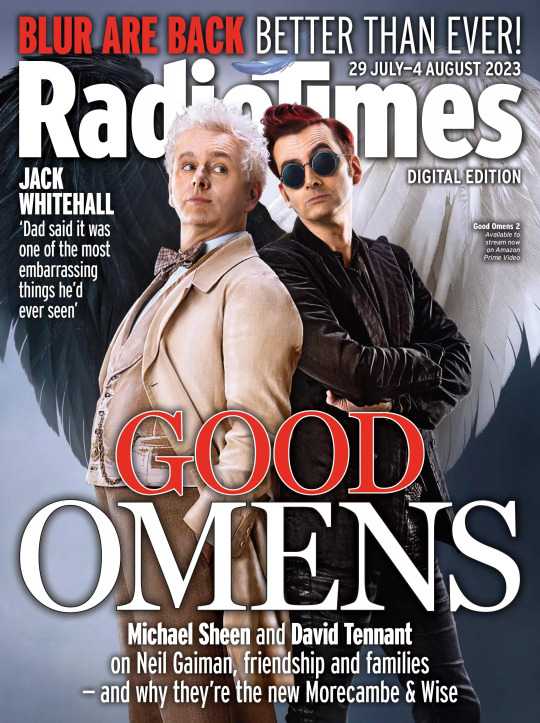
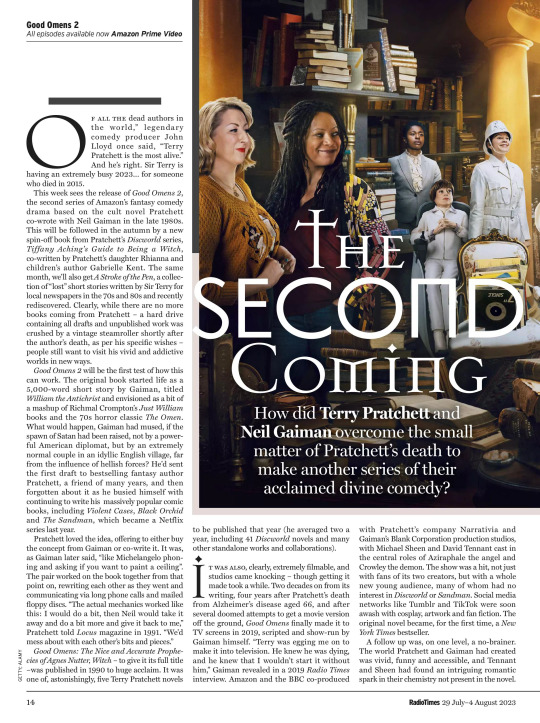
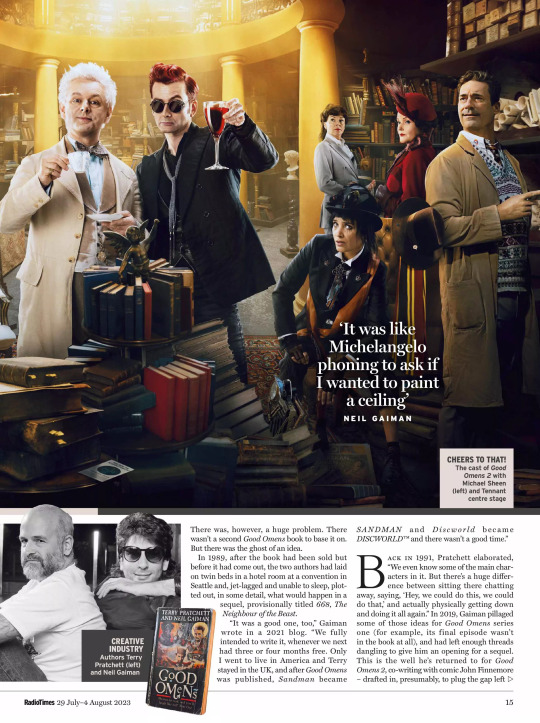
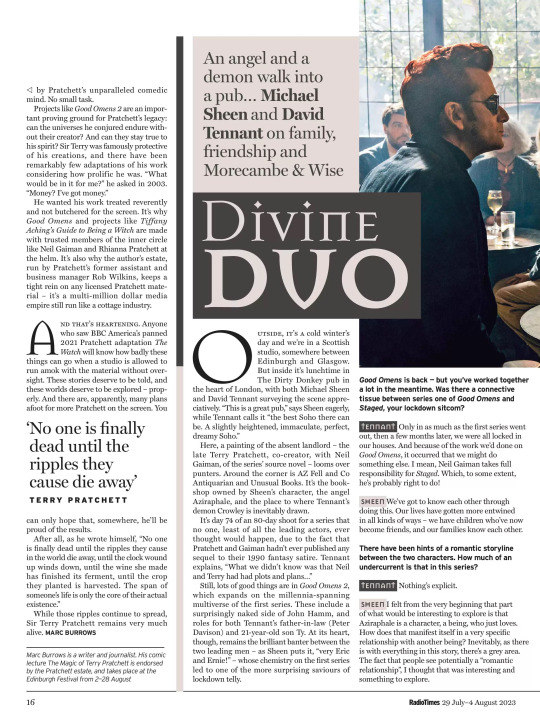
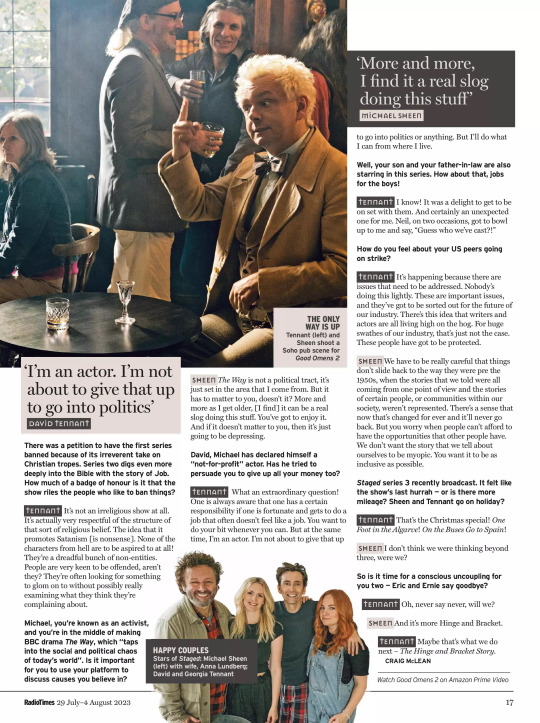
The Radio Times magazine from the 29 July-04 August 2023 :)
THE SECOND COMING
How did Terry Pratchett and Neil gaiman overcome the small matter of Pratchett's death to make another series of their acclaimed divine comedy?
For all the dead authors in the world,” legendary comedy producer John Lloyd once said, “Terry Pratchett is the most alive.” And he’s right. Sir Terry is having an extremely busy 2023… for someone who died in 2015.
This week sees the release of Good Omens 2, the second series of Amazon’s fantasy comedy drama based on the cult novel Pratchett co-wrote with Neil Gaiman in the late 1980s. This will be followed in the autumn by a new spin-off book from Pratchett’s Discworld series, Tiffany Aching’s Guide to Being a Witch, co-written by Pratchett’s daughter Rhianna and children’s author Gabrielle Kent. The same month, we’ll also get A Stroke of the Pen, a collection of “lost” short stories written by Sir Terry for local newspapers in the 70s and 80s and recently rediscovered. Clearly, while there are no more books coming from Pratchett – a hard drive containing all drafts and unpublished work was crushed by a vintage steamroller shortly after the author’s death, as per his specific wishes – people still want to visit his vivid and addictive worlds in new ways.
Good Omens 2 will be the first test of how this can work. The original book started life as a 5,000-word short story by Gaiman, titled William the Antichrist and envisioned as a bit of a mashup of Richmal Crompton’s Just William books and the 70s horror classic The Omen. What would happen, Gaiman had mused, if the spawn of Satan had been raised, not by a powerful American diplomat, but by an extremely normal couple in an idyllic English village, far from the influence of hellish forces? He’d sent the first draft to bestselling fantasy author Pratchett, a friend of many years, and then forgotten about it as he busied himself with continuing to write his massively popular comic books, including Violent Cases, Black Orchid and The Sandman, which became a Netflix series last year.
Pratchett loved the idea, offering to either buy the concept from Gaiman or co-write it. It was, as Gaiman later said, “like Michelangelo phoning and asking if you want to paint a ceiling” The pair worked on the book together from that point on, rewriting each other as they went and communicating via long phone calls and mailed floppy discs. “The actual mechanics worked like this: I would do a bit, then Neil would take it away and do a bit more and give it back to me,” Pratchett told Locus magazine in 1991. “We’d mess about with each other’s bits and pieces.”
Good Omens: The Nice and Accurate Prophecies of Agnes Nutter, Witch – to give it its full title –was published in 1990 to huge acclaim. It was one of, astonishingly, five Terry Pratchett novels to be published that year (he averaged two a year, including 41 Discworld novels and many other standalone works and collaborations).
It was also, clearly, extremely filmable, and studios came knocking — though getting it made took a while. rnvo decades on from its writing, four years after Pratchett's death from Alzheimer's disease aged 66, and after several doomed attempts to get a movie version off the ground, Good Omens finally made it to TV screens in 2019, scripted and show-run by Gaiman himself. "Terry was egging me on to make it into television. He knew he was dying, and he knew that I wouldn't start it without him," Gaiman revealed in a 2019 Radio Times interview. Amazon and the BBC co-produced with Pratchett's company Narrativia and Gaiman's Blank Corporation production studios, with Michael Sheen and David Tennant cast in the central roles of Aziraphale the angel and Crowley the demon. The show was a hit, not just with fans of its two creators, but with a whole new young audience, many of whom had no interest in Discworld or Sandman. Social media networks like Tumblr and TikTok were soon awash with cosplay, artwork and fan fiction. The original novel became, for the first time, a New York Times bestseller.
A follow up was, on one level, a no-brainer. The world Pratchett and Gaiman had created was vivid, funny and accessible, and Tennant and Sheen had found an intriguing romantic spark in their chemistry not present in the novel.
There was, however, a huge problem. There wasn't a second Good Omens book to base it on. But there was the ghost of an idea.
In 1989, after the book had been sold but before it had come out, the two authors had laid on fivin beds in a hotel room at a convention in Seattle and, jet-lagged and unable to sleep, plotted out, in some detail, what would happen in a sequel, provisionally titled 668, The II Neighbour of the Beast.
"It was a good one, too" Gaiman wrote in a 2021 blog. "We fully intended to write it, whenever we next had three or four months free. Only I went to live in America and Terry stayed in the UK, and after Good Omens was published, Sandman became SANDMAN and Discworld became DISCWORLD(TM) and there wasn't a good time."
Back in 1991, Pratchett elaborated, "We even know some of the main characters in it. But there's a huge difference between sitting there chatting away, saying, 'Hey, we could do this, we could do that,' and actually physically getting down and doing it all again." In 2019, Gaiman pillaged some of those ideas for Good Omens series one (for example, its final episode wasn't in the book at all), and had left enough threads dangling to give him an opening for a sequel. This is the well he's returned to for Good Omens 2, co-writing with comic John Finnemore - drafted in, presumably, to plug the gap left Pratchett's unparalleled comedic mind. No small task.
Projects like Good Omens 2 are an important proving ground for Pratchett's legacy: can the universes he conjured endure without their creator? And can they stay true to his spirit? Sir Terry was famously protective of his creations, and there have been remarkably few adaptations of his work considering how prolific he was. "What would be in it for me?" he asked in 2003. "Money? I've got money."
He wanted his work treated reverently and not butchered for the screen. It's why Good Omens and projects like Tiffany Aching's Guide to Being a Witch are made with trusted members of the inner circle like Neil Gaiman and Rhianna Pratchett at the helm. It's also why the author's estate, run by Pratchett's former assistant and business manager Rob Wilkins, keeps a tight rein on any licensed Pratchett material — it's a multi-million dollar media empire still run like a cottage industry.
And that's heartening. Anyone who saw BBC America's panned 2021 Pratchett adaptation The Watch will know how badly these things can go when a studio is allowed to run amok with the material without oversight. These stories deserve to be told, and these worlds deserve to be explored — properly. And there are, apparently, many plans afoot for more Pratchett on the screen. You can only hope that, somewhere, he'll be proud of the results.
After all, as he wrote himself, "No one is finally dead until the ripples they cause in the world die away, until the clock wound up winds down, until the wine she made has finished its ferment, until the crop they planted is harvested. The span of someone's life is only the core of their actual existence."
While those ripples continue to spread, Sir Terry Pratchett remains very much alive. MARC BURROWS
DIVINE DUO
An angel and a demon walk into a pub... Michael Sheen and David Tennant on family, friendship and Morecambe & Wise
Outside it's cold winter's day and we're in a Scottish studio, somewhere between Edinburgh and Glasgow. But inside it's lunchtime in The Dirty Donkey pub in the heart of London, with both Michael Sheen and David Tennant surveying the scene appreciatively. "This is a great pub," says Sheen eagerly, while Tennant calls it "the best Soho there can be. A slightly heightened, immaculate, perfect, dreamy Soho."
Here, a painting of the absent landlord — the late Terry Pratchett, co-creator, with Neil Gaiman, of the series' source novel — looms over punters. Around the corner is AZ Fell and Co Antiquarian and Unusual Books. It's the bookshop owned by Sheen's character, the angel Aziraphale, and the place to where Tennant's demon Crowley is inevitably drawn.
It's day 74 of an 80-day shoot for a series that no one, least of all the leading actors, ever thought would happen, due to the fact that Pratchett and Gaiman hadn't ever published any sequel to their 1990 fantasy satire. Tennant explains, "What we didn't know was that Neil and Terry had had plots and plans..."
Still, lots of good things are in Good Omens 2, which expands on the millennia-spanning multiverse of the first series. These include a surprisingly naked side of John Hamm, and roles for both Tennant's father-in-law (Peter Davison) and 21-year-old son Ty. At its heart, though, remains the brilliant banter between the two leading men — as Sheen puts it, "very Eric and Ernie !" — whose chemistry on the first series led to one of the more surprising saviours of lockdown telly.
Good Omens is back — but you've worked together a lot in the meantime. Was there a connective tissue between series one of Good Omens and Staged, your lockdown sitcom?
David: Only in as much as the first series went out, then a few months later, we were all locked in our houses. And because of the work we'd done on Good Omens, it occurred that we might do something else. I mean, Neil Gaiman takes full responsibility for Staged. Which, to some extent, he's probably right to do!
Michael: We've got to know each other through doing this. Our lives have gotten more entwined in all kinds of ways — we have children who've now become friends, and our families know each other.
There have been hints of a romantic storyline between the two characters. How much of an undercurrent is that in this series.
David: Nothing's explicit.
Michael: I felt from the very beginning that part of what would be interesting to explore is that Aziraphale is a character, a being, who just loves. How does that manifest itself in a very specific relationship with another being? Inevitably, as there is with everything in this story, there's a grey area. The fact that people see potentially a "romantic relationship", I thought that was interesting and something to explore.
There was a petition to have the first series banned because of its irreverent take on Christian tropes. Series two digs even more deeply into the Bible with the story of Job. How much of a badge of honour is it that the show riles the people who like to ban things?
David: It's not an irreligious show at all. It's actually very respectful of the structure of that sort of religious belief. The idea that it promotes Satanism [is nonsense]. None of the characters from hell are to be aspired to at all! They're a dreadful bunch of non-entities. People are very keen to be offended, aren't they? They're often looking for something to glom on to without possibly really examining what they think they're complaining about.
Michael, you're known as an activist, and you're in the middle of Making BBC drama The Way, which "taps into the social and political chaos of today's world". Is it important for you to use your plaform to discuss causes you believe in?
Michael: The Way is not a political tract, it's just set in the area that I come from. But it has to matter to you, doesn't it? More and more as I get older, [I find] it can be a real slog doing this stuff. You've got to enjoy it. And if it doesn't matter to you, then it's just going to be depressing.
David, Michael has declared himself a "not-for-profit" actor. Has he tried to persuade you to give up all your money too?
David: What an extraordinary question! One is always aware that one has a certain responsibility if one is fortunate and gets to do a job that often doesn't feel like a job. You want to do your bit whenever you can. But at the same time, I'm an actor. I'm not about to give that up to go into politics or anything. But I'll do what I can from where I live.
Well, your son and your father-in-law are also starring in this series. How about that, jobs for the boys!
David: I know! It was a delight to get to be on set with them. And certainly an unexpected one for me. Neil, on two occasions, got to bowl up to me and say, "Guess who we've cast?!"
How do you feel about your US peers going on strike?
David: It's happening because there are issues that need to be addressed. Nobody's doing this lightly. These are important issues, and they've got to be sorted out for the future of our industry. There's this idea that writers and actors are all living high on the hog. For huge swathes of our industry, that's just not the case. These people have got to be protected.
Michael: We have to be really careful that things don't slide back to the way they were pre the 1950s, when the stories that we told were all coming from one point of view and the stories of certain people, or communities within our society, weren't represented. There's a sense that now that's changed for ever and it'll never go back. But you worry when people can't afford to have the opportunities that other people have. We don't want the story that we tell about ourselves to be myopic. You want it to be as inclusive as possible
Staged series 3 recently broadcast. It felt like the show's last hurrah — or is there more mileage? Sheen and Tennant go on holiday?
David: That's the Christmas special! One Foot in the Algarve! On the Buses Go to Spain!
Michael: I don't think we were thinking beyond three, were we?
So is it time for a conscious uncoupling for you two — Eric and Ernie say goodbye?
David: Oh, never say never, will we?
Michael: And it's more Hinge and Bracket.
David: Maybe that's what we do next — The Hinge and Bracket Story. CRAIG McLEAN
#good omens#gos2#season 2#radio times#radio times 2023#interview#magazines#neil gaiman#terry pratchett#david tennant#michael sheen#david interview#michael interview#neil interview#terry interview#bts#fun fact#staged#the way#s2 interview#transcripts
895 notes
·
View notes
Note
not sure if you’ve been asked this before but why did you pick Everyday by Buddy Holly?
In 1991 Terry Pratchett and I were staying in the Chateau Marmont hotel in LA writing Outline after Outline for a Good Omens movie for Sovereign Pictures. And at some point Terry and I started talking about songs, and I said it would be great to find a good End of the World song, and Terry suggested "Everyday" by Buddy Holly. He pointed out that on one level it was a cheerful upbeat love song, but in another way it seemed to be describing the impending arrival of something unstoppable and dark:
Every day, it's a-getting closer...
So when I wrote Season 1, I threaded "Everyday" through it. But then David Arnold wrote the Good Omens theme, which was even better. So we never used Everyday.
1K notes
·
View notes
Text
Shamir Secret Sharing
It’s 3am. Paul, the head of PayPal database administration carefully enters his elaborate passphrase at a keyboard in a darkened cubicle of 1840 Embarcadero Road in East Palo Alto, for the fifth time. He hits Return. The green-on-black console window instantly displays one line of text: “Sorry, one or more wrong passphrases. Can’t reconstruct the key. Goodbye.”
There is nerd pandemonium all around us. James, our recently promoted VP of Engineering, just climbed the desk at a nearby cubicle, screaming: “Guys, if we can’t get this key the right way, we gotta start brute-forcing it ASAP!” It’s gallows humor – he knows very well that brute-forcing such a key will take millions of years, and it’s already 6am on the East Coast – the first of many “Why is PayPal down today?” articles is undoubtedly going to hit CNET shortly. Our single-story cubicle-maze office is buzzing with nervous activity of PayPalians who know they can’t help but want to do something anyway. I poke my head up above the cubicle wall to catch a glimpse of someone trying to stay inside a giant otherwise empty recycling bin on wheels while a couple of Senior Software Engineers are attempting to accelerate the bin up to dangerous speeds in the front lobby. I lower my head and try to stay focused. “Let’s try it again, this time with three different people” is the best idea I can come up with, even though I am quite sure it will not work.
It doesn’t.
The key in question decrypts PayPal’s master payment credential table – also known as the giant store of credit card and bank account numbers. Without access to payment credentials, PayPal doesn’t really have a business per se, seeing how we are supposed to facilitate payments, and that’s really hard to do if we no longer have access to the 100+ million credit card numbers our users added over the last year of insane growth.
This is the story of a catastrophic software bug I briefly introduced into the PayPal codebase that almost cost us the company (or so it seemed, in the moment.) I’ve told this story a handful of times, always swearing the listeners to secrecy, and surprisingly it does not appear to have ever been written down before. 20+ years since the incident, it now appears instructive and a little funny, rather than merely extremely embarrassing.
Before we get back to that fateful night, we have to go back another decade. In the summer of 1991, my family and I moved to Chicago from Kyiv, Ukraine. While we had just a few hundred dollars between the five of us, we did have one secret advantage: science fiction fans.
My dad was a highly active member of Zoryaniy Shlyah – Kyiv’s possibly first (and possibly only, at the time) sci-fi fan club – the name means “Star Trek” in Ukrainian, unsurprisingly. He translated some Stansilaw Lem (of Solaris and Futurological Congress fame) from Polish to Russian in the early 80s and was generally considered a coryphaeus at ZSh.
While USSR was more or less informationally isolated behind the digital Iron Curtain until the late ‘80s, by 1990 or so, things like FidoNet wriggled their way into the Soviet computing world, and some members of ZSh were now exchanging electronic mail with sci-fi fans of the free world.
The vaguely exotic news of two Soviet refugee sci-fi fans arriving in Chicago was transmitted to the local fandom before we had even boarded the PanAm flight that took us across the Atlantic [1]. My dad (and I, by extension) was soon adopted by some kind Chicago science fiction geeks, a few of whom became close friends over the years, though that’s a story for another time.
A year or so after the move to Chicago, our new sci-fi friends invited my dad to a birthday party for a rising star of the local fandom, one Bruce Schneier. We certainly did not know Bruce or really anyone at the party, but it promised good food, friendly people, and probably filk. My role was to translate, as my dad spoke limited English at the time.
I had fallen desperately in love with secret codes and cryptography about a year before we left Ukraine. Walking into Bruce’s library during the house tour (this was a couple years before Applied Cryptography was published and he must have been deep in research) felt like walking into Narnia.
I promptly abandoned my dad to fend for himself as far as small talk and canapés were concerned, and proceeded to make a complete ass out of myself by brazenly asking the host for a few sheets of paper and a pencil. Having been obliged, I pulled a half dozen cryptography books from the shelves and went to work trying to copy down some answers to a few long-held questions on the library floor. After about two hours of scribbling alone like a man possessed, I ran out of paper and decided to temporarily rejoin the party.
On the living room table, Bruce had stacks of copies of his fanzine Ramblings. Thinking I could use the blank sides of the pages to take more notes, I grabbed a printout and was about to quietly return to copying the original S-box values for DES when my dad spotted me from across the room and demanded I help him socialize. The party wrapped soon, and our friends drove us home.
The printout I grabbed was not a Ramblings issue. It was a short essay by Bruce titled Sharing Secrets Among Friends, essentially a humorous explanation of Shamir Secret Sharing.
Say you want to make sure that something really really important and secret (a nuclear weapon launch code, a database encryption key, etc) cannot be known or used by a single (friendly) actor, but becomes available, if at least n people from a group of m choose to do it. Think two on-duty officers (from a cadre of say 5) turning keys together to get ready for a nuke launch.
The idea (proposed by Adi Shamir – the S of RSA! – in 1979) is as simple as it is beautiful.
Let’s call the secret we are trying to split among m people K.
First, create a totally random polynomial that looks like: y(x) = C0 * x^(n-1) + C1 * x^(n-2) + C2 * x^(n-3) ….+ K. “Create” here just means generate random coefficients C. Now, for every person in your trusted group of m, evaluate the polynomial for some randomly chosen Xm and hand them their corresponding (Xm,Ym) each.
If we have n of these points together, we can use Lagrange interpolating polynomial to reconstruct the coefficients – and evaluate the original polynomial at x=0, which conveniently gives us y(0) = K, the secret. Beautiful. I still had the printout with me, years later, in Palo Alto.
It should come as no surprise that during my time as CTO PayPal engineering had an absolute obsession with security. No firewall was one too many, no multi-factor authentication scheme too onerous, etc. Anything that was worth anything at all was encrypted at rest.
To decrypt, a service would get the needed data from its database table, transmit it to a special service named cryptoserv (an original SUN hardware running Solaris sitting on its own, especially tightly locked-down network) and a special service running only there would perform the decryption and send back the result.
Decryption request rate was monitored externally and on cryptoserv, and if there were too many requests, the whole thing was to shut down and purge any sensitive data and keys from its memory until manually restarted.
It was this manual restart that gnawed at me. At launch, a bunch of configuration files containing various critical decryption keys were read (decrypted by another key derived from one manually-entered passphrase) and loaded into the memory to perform future cryptographic services.
Four or five of us on the engineering team knew the passphrase and could restart cryptoserv if it crashed or simply had to have an upgrade. What if someone performed a little old-fashioned rubber-hose cryptanalysis and literally beat the passphrase out of one of us? The attacker could theoretically get access to these all-important master keys. Then stealing the encrypted-at-rest database of all our users’ secrets could prove useful – they could decrypt them in the comfort of their underground supervillain lair.
I needed to eliminate this threat.
Shamir Secret Sharing was the obvious choice – beautiful, simple, perfect (you can in fact prove that if done right, it offers perfect secrecy.) I decided on a 3-of-8 scheme and implemented it in pure POSIX C for portability over a few days, and tested it for several weeks on my Linux desktop with other engineers.
Step 1: generate the polynomial coefficients for 8 shard-holders.
Step 2: compute the key shards (x0, y0) through (x7, y7)
Step 3: get each shard-holder to enter a long, secure passphrase to encrypt the shard
Step 4: write out the 8 shard files, encrypted with their respective passphrases.
And to reconstruct:
Step 1: pick any 3 shard files.
Step 2: ask each of the respective owners to enter their passphrases.
Step 3: decrypt the shard files.
Step 4: reconstruct the polynomial, evaluate it for x=0 to get the key.
Step 5: launch cryptoserv with the key.
One design detail here is that each shard file also stored a message authentication code (a keyed hash) of its passphrase to make sure we could identify when someone mistyped their passphrase. These tests ran hundreds and hundreds of times, on both Linux and Solaris, to make sure I did not screw up some big/little-endianness issue, etc. It all worked perfectly.
A month or so later, the night of the key splitting party was upon us. We were finally going to close out the last vulnerability and be secure. Feeling as if I was about to turn my fellow shard-holders into cymeks, I gathered them around my desktop as PayPal’s front page began sporting the “We are down for maintenance and will be back soon” message around midnight.
The night before, I solemnly generated the new master key and securely copied it to cryptoserv. Now, while “Push It” by Salt-n-Pepa blared from someone’s desktop speakers, the automated deployment script copied shard files to their destination.
While each of us took turns carefully entering our elaborate passphrases at a specially selected keyboard, Paul shut down the main database and decrypted the payment credentials table, then ran the script to re-encrypt with the new key. Some minutes later, the database was running smoothly again, with the newly encrypted table, without incident.
All that was left was to restore the master key from its shards and launch the new, even more secure cryptographic service.
The three of us entered our passphrases… to be met with the error message I haven’t seen in weeks: “Sorry, one or more wrong passphrases. Can’t reconstruct the key. Goodbye.” Surely one of us screwed up typing, no big deal, we’ll do it again. No dice. No dice – again and again, even after we tried numerous combinations of the three people necessary to decrypt.
Minutes passed, confusion grew, tension rose rapidly.
There was nothing to do, except to hit rewind – to grab the master key from the file still sitting on cryptoserv, split it again, generate new shards, choose passphrases, and get it done. Not a great feeling to have your first launch go wrong, but not a huge deal either. It will all be OK in a minute or two.
A cursory look at the master key file date told me that no, it wouldn’t be OK at all. The file sitting on cryptoserv wasn’t from last night, it was created just a few minutes ago. During the Salt-n-Pepa-themed push from stage, we overwrote the master key file with the stage version. Whatever key that was, it wasn’t the one I generated the day before: only one copy existed, the one I copied to cryptoserv from my computer the night before. Zero copies existed now. Not only that, the push script appears to have also wiped out the backup of the old key, so the database backups we have encrypted with the old key are likely useless.
Sitrep: we have 8 shard files that we apparently cannot use to restore the master key and zero master key backups. The database is running but its secret data cannot be accessed.
I will leave it to your imagination to conjure up what was going through my head that night as I stared into the black screen willing the shards to work. After half a decade of trying to make something of myself (instead of just going to work for Microsoft or IBM after graduation) I had just destroyed my first successful startup in the most spectacular fashion.
Still, the idea of “what if we all just continuously screwed up our passphrases” swirled around my brain. It was an easy check to perform, thanks to the included MACs. I added a single printf() debug statement into the shard reconstruction code and instead of printing out a summary error of “one or more…” the code now showed if the passphrase entered matched the authentication code stored in the shard file.
I compiled the new code directly on cryptoserv in direct contravention of all reasonable security practices – what did I have to lose? Entering my own passphrase, I promptly got “bad passphrase” error I just added to the code. Well, that’s just great – I knew my passphrase was correct, I had it written down on a post-it note I had planned to rip up hours ago.
Another person, same error. Finally, the last person, JK, entered his passphrase. No error. The key still did not reconstruct correctly, I got the “Goodbye”, but something worked. I turned to the engineer and said, “what did you just type in that worked?”
After a second of embarrassed mumbling, he admitted to choosing “a$$word” as his passphrase. The gall! I asked everyone entrusted with the grave task of relaunching crytposerv to pick really hard to guess passphrases, and this guy…?! Still, this was something -- it worked. But why?!
I sprinted around the half-lit office grabbing the rest of the shard-holders demanding they tell me their passphrases. Everyone else had picked much lengthier passages of text and numbers. I manually tested each and none decrypted correctly. Except for the a$$word. What was it…
A lightning bolt hit me and I sprinted back to my own cubicle in the far corner, unlocked the screen and typed in “man getpass” on the command line, while logging into cryptoserv in another window and doing exactly the same thing there. I saw exactly what I needed to see.
Today, should you try to read up the programmer’s manual (AKA the man page) on getpass, you will find it has been long declared obsolete and replaced with a more intelligent alternative in nearly all flavors of modern Unix.
But back then, if you wanted to collect some information from the keyboard without printing what is being typed in onto the screen and remain POSIX-compliant, getpass did the trick. Other than a few standard file manipulation system calls, getpass was the only operating system service call I used, to ensure clean portability between Linux and Solaris.
Except it wasn’t completely clean.
Plain as day, there it was: the manual pages were identical, except Solaris had a “special feature”: any passphrase entered that was longer than 8 characters long was automatically reduced to that length anyway. (Who needs long passwords, amiright?!)
I screamed like a wounded animal. We generated the key on my Linux desktop and entered our novel-length passphrases right here. Attempting to restore them on a Solaris machine where they were being clipped down to 8 characters long would never work. Except, of course, for a$$word. That one was fine.
The rest was an exercise in high-speed coding and some entirely off-protocol file moving. We reconstructed the master key on my machine (all of our passphrases worked fine), copied the file to the Solaris-running cryptoserv, re-split it there (with very short passphrases), reconstructed it successfully, and PayPal was up and running again like nothing ever happened.
By the time our unsuspecting colleagues rolled back into the office I was starting to doze on the floor of my cubicle and that was that. When someone asked me later that day why we took so long to bring the site back up, I’d simply respond with “eh, shoulda RTFM.”
RTFM indeed.
P.S. A few hours later, John, our General Counsel, stopped by my cubicle to ask me something. The day before I apparently gave him a sealed envelope and asked him to store it in his safe for 24 hours without explaining myself. He wanted to know what to do with it now that 24 hours have passed.
Ha. I forgot all about it, but in a bout of “what if it doesn’t work” paranoia, I printed out the base64-encoded master key when we had generated it the night before, stuffed it into an envelope, and gave it to John for safekeeping. We shredded it together without opening and laughed about what would have never actually been a company-ending event.
P.P.S. If you are thinking of all the ways this whole SSS design is horribly insecure (it had some real flaws for sure) and plan to poke around PayPal to see if it might still be there, don’t. While it served us well for a few years, this was the very first thing eBay required us to turn off after the acquisition. Pretty sure it’s back to a single passphrase now.
Notes:
1: a member of Chicagoland sci-fi fan community let me know that the original news of our move to the US was delivered to them via a posted letter, snail mail, not FidoNet email!
521 notes
·
View notes
Text
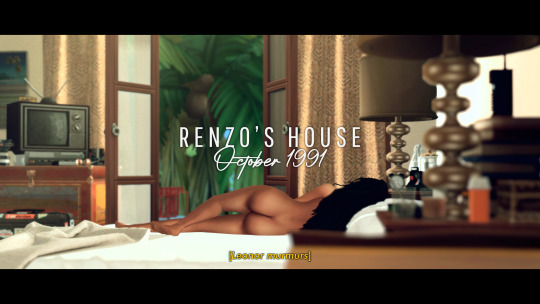
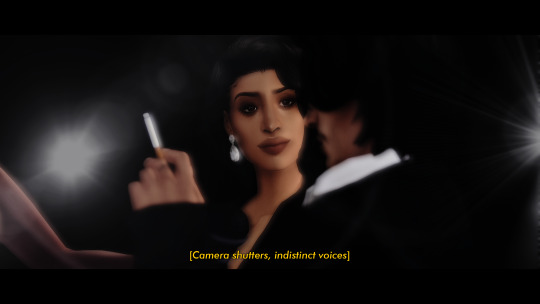

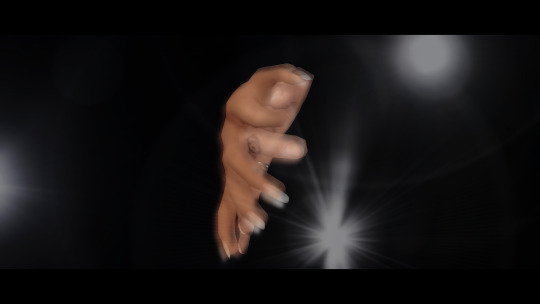
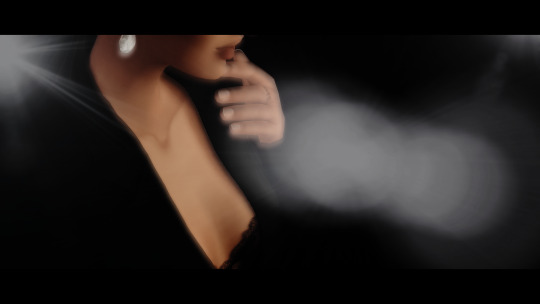
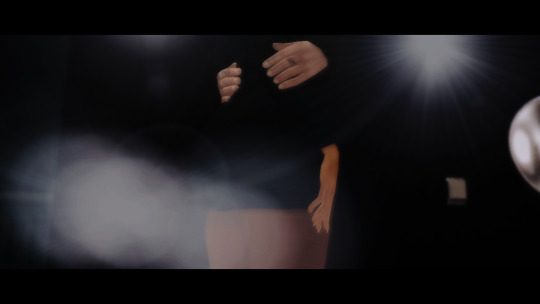
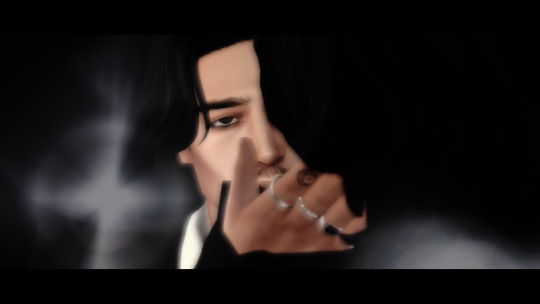
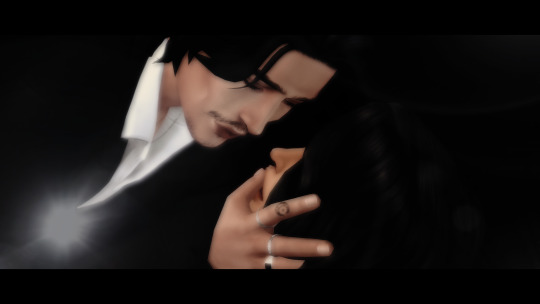
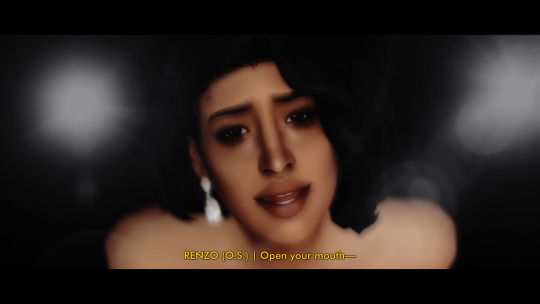

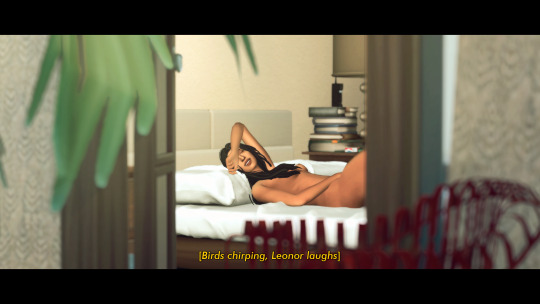
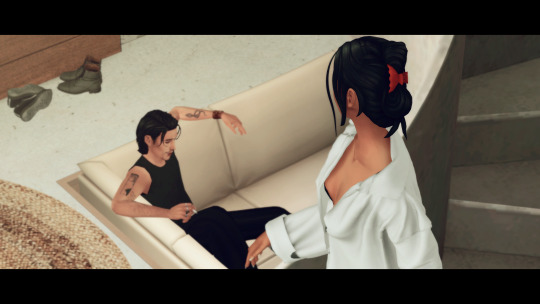
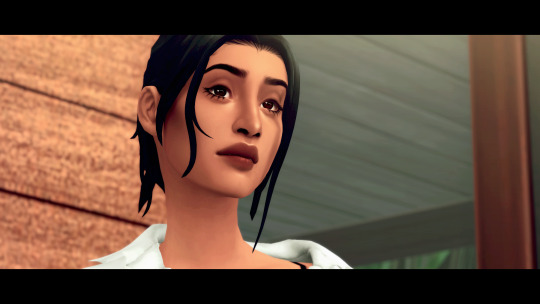

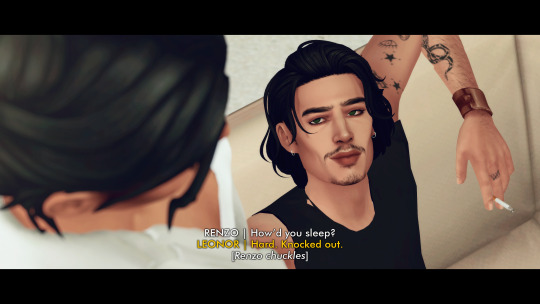
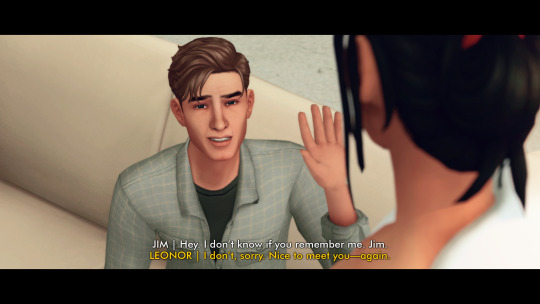
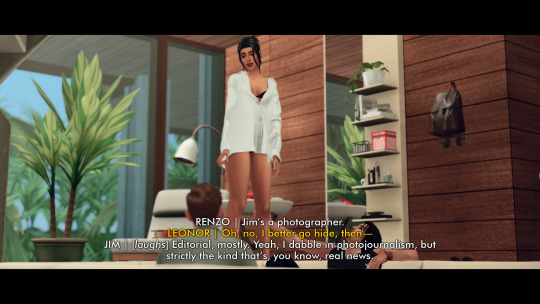
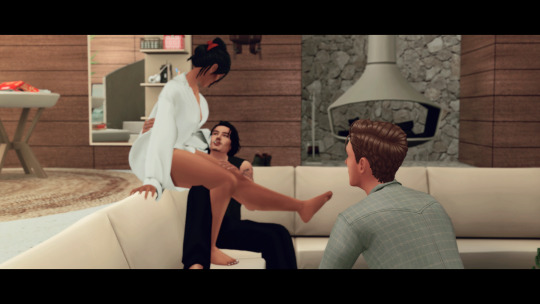
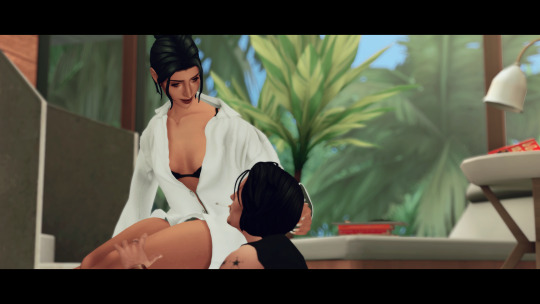
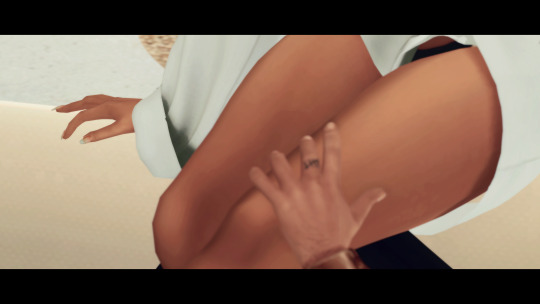
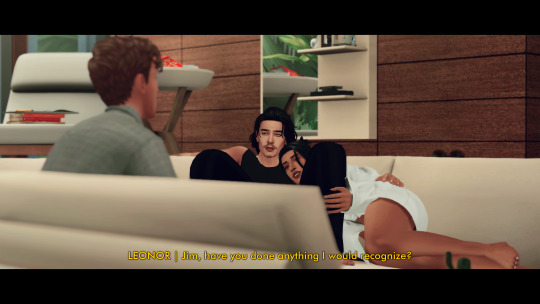
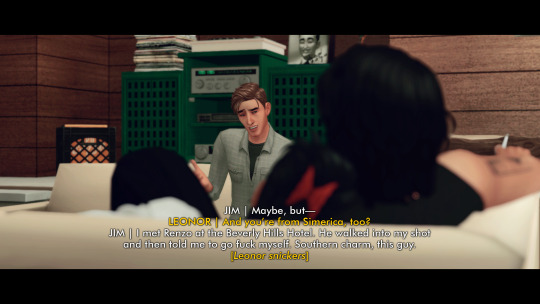
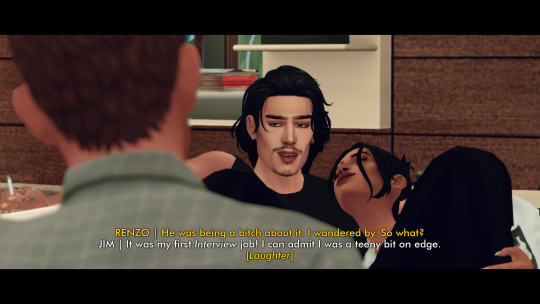
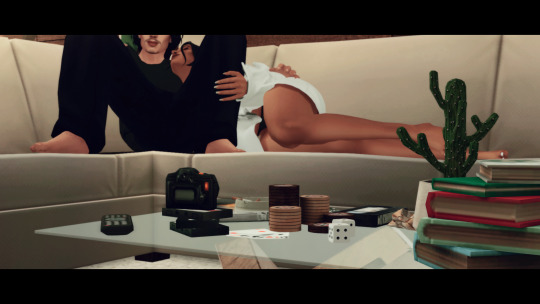
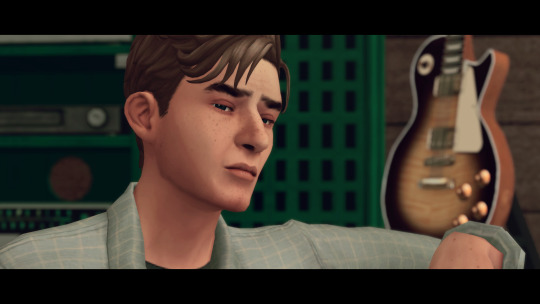
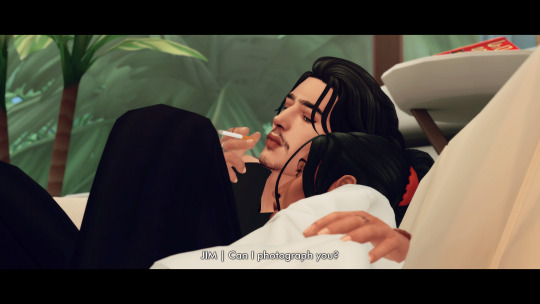
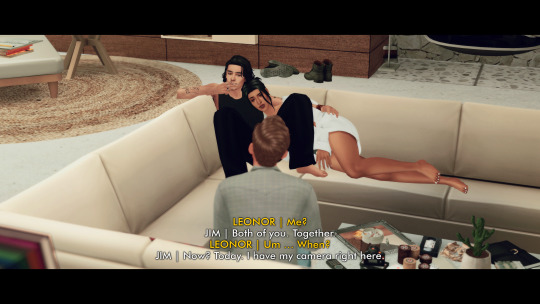
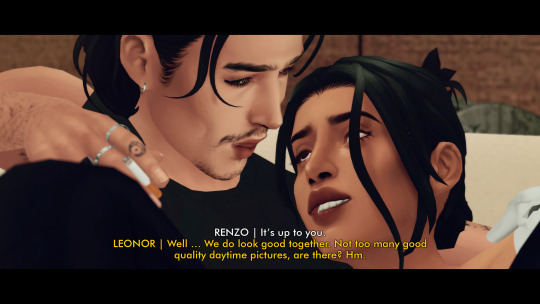
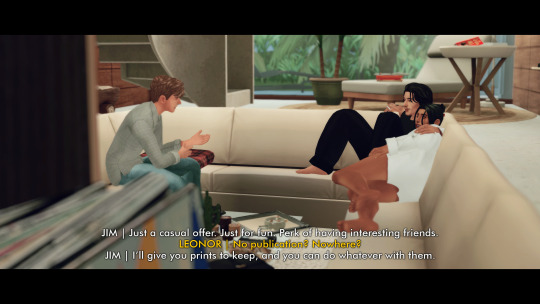
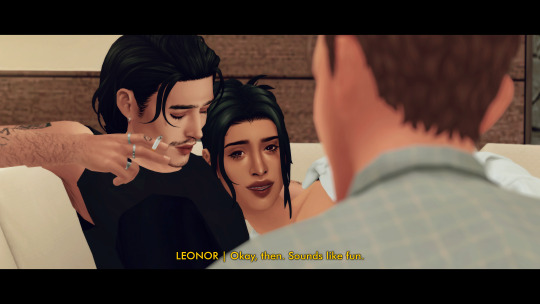
𝐍𝐎. 𝟏𝟑 ❛ 𝐡𝐨𝐭 𝐚𝐧𝐝 𝐟𝐚𝐬𝐭 ❜ | RENZO'S HOUSE, NAKAWE, OCTOBER 1991
❧ 𝐝𝐢𝐫𝐞𝐜𝐭𝐨𝐫𝐲 / 𝐛𝐞𝐠𝐢𝐧𝐧𝐢𝐧𝐠 / 𝐩𝐫𝐞𝐯𝐢𝐨𝐮𝐬 / 𝐧𝐞𝐱𝐭.
Leonor knew she was imposing. Although with permission, she let herself into the most private circle of Renzo’s life, one from which he had barred her for months. There hadn’t been any negotiating it, and she couldn’t say whether that made it better or worse. Rather, she hadn’t tried to go where he didn’t seem to want her. She also hadn’t tried to discover whether it was a matter of wanting at all. He did want her. He had, with clarity and audacity, from the day they met. She’d seen how he treated people that he didn’t want but had yet to experience that kind of terrible disregard from him.
❧ i don't recall when these ideas came to me and melded together but i'm glad they did also hopefully goes without saying but there's time weirdness that'll be addressed subsequently ! also 2x maybe i’m wrong but there aren’t enough bj fantasies given how much some enjoy giving them, idk idk
𝐟𝐮𝐥𝐥 𝐬𝐜𝐞𝐧𝐞 & 𝐭𝐫𝐚𝐧𝐬𝐜𝐫𝐢𝐩𝐭 ↓
Leonor knew she was imposing. Although with permission, she let herself into the most private circle of Renzo’s life, one from which he had barred her for months. There hadn’t been any negotiating it, and she couldn’t say whether that made it better or worse. Rather, she hadn’t tried to go where he didn’t seem to want her. She also hadn’t tried to discover whether it was a matter of wanting at all. He did want her. He had, with clarity and audacity, from the day they met. She’d seen how he treated people that he didn’t want but had yet to experience that kind of terrible disregard from him.
Still, for all they discussed, the red lines and boundaries of their own relationship went without remark—either unspeakable or so self-evident as to require no demarcation. Leonor believed most of the time that it was the latter. She knew that her life had steadily cohered around his. The rhythm of it attracted her, able to fill the grave-silent vacuum where her own had once been. Although it had, important distinctions remained. Now, waking up in his bed, surrounding by what looked to be all of his worldly possessions, knowing he allowed her to be there because she needed him that much, because he cared about her that much, she suspected at least one distinction had blurred irrevocably.
Just as quick as the realization took hold, so too did the understanding that it didn’t bother her. She noted she was alone in the room. That meant something. She took in the sight of everything bathed in daylight, from the careless stacks of books to the rumpled clothes strewn on the floor to the overflowing boxes shoved into the small room’s corners. It had seemed peculiar to her that he lived in the guesthouse instead of the perfectly suitable villa to which it belonged. Looking around, she began to appreciate why he would make such a choice. For anyone else, it would have been silly or, worse, performative. Leonor, rolling over into the pillows that smelled like him, felt she now unlocked some deeper knowledge of everything he had ever told her about himself—like she could feel what he felt when he claimed to be so uncomfortable and discontent in places other people might kill to experience. In that, yet another distinction dissolved.
Renzo hadn’t answered the phone when Leonor called, and his flippant prerecorded message sounded cruel as it played. Her hope had been reassurance—comfort, really—in the clarity he tended to offer. Instead, the sound of his voice disheartened her further. Her mind raced all night without guidance to quiet it. It chased away sleep, banging together gut-wrenching thoughts with insistence and urgency. The idea of her mother’s belongings cast out into the world, ripped away before she could claim them for her own sentimental needs, felt just as discordant as the haphazard crashing of cymbals. She had grasped onto half-formed notions of how to retrieve these mysterious belongings, but a plan refused to cohere. Even after crying as she hadn’t in weeks, the burden of emotional exhaustion didn’t slow down the pace of her thoughts.
She slept much better in Renzo’s bed, even if it was the first time she’d ever been in it.
He was a private person and, anyway, she had eagerly brought him into her house. His opinion mattered to her as soon as he set foot inside; he liked the artwork in her dining room so much that she'd immediately gifted him one of the large pieces, frame and all. It perplexed him, as if he wasn't sure what he would do with it. 'You don't collect it?' she asked him. He shrugged. 'That's what everyone asks. I should smarten up, huh?' Leonor had imagined his home full of art—obscure, iconoclastic finds, too, not the low-hanging fruit. That exchange and several others kept her curious about what his home looked like.
Luckily, she was the nosy kind of curious. She asked around without shame on a couple of occasions, wondering aloud where he lived and what his house was like. She did know his address. He’d given it to her driver, at the end of long nights or when he left her house in the afternoon. All it told her was that he lived in a quiet, star-studded neighborhood that was the new money equivalent of her own. That wasn’t surprising, even if she imagined him in a trendy downtown apartment rather than one of those high-walled coastal villas. His friends offered less-than-colorful descriptions of what was inside. They seemed confused by the question, even. ‘It’s just a house.’ He wasn’t much for decorating. They went over to drink and smoke and and gamble and watch films. She could imagine it well enough, a gaggle of off-duty actors squished together on a big couch. What kind of couch, though? That was the root of it—she could imagine Renzo’s eyes lighting up at the sight of an old, ugly sofa in a dusty secondhand store, but she couldn’t quite picture him bringing it home with any purpose or intent. In the same way she inherited a house designed for someone else, she supposed he simply occupied someone else’s dream home.
As it turned out, that was the case. Imposing fences, dense foliage, and locked gates hid all the houses on the street from view. Leonor had initially noted the averageness of the house itself, but she soon found herself more intrigued by the discovery that he resided in the guesthouse instead. She'd cast a glance back at the main house looming large and empty, then laughed as she turned back to the little doll’s home Renzo preferred. Inside, Leonor flipped on every light she encountered as she wandered around. She had felt a strange, sheepish delight that he wasn’t present to observe the way her eyes lingered on every detail. It was greedy, but she wanted to see everything that was his.
The guesthouse possessed a neutral, modern style that didn’t represent Renzo very well, but he had made it his own. His old shoes piled up in the entryway. The living room, small to her but an open cavern in reality, bore the colorful imprint of his time spent there. VHS tapes clustered around the television set. Evidence of card games past littered the coffee table, along with books, a full ashtray, abandoned bottles of lukewarm beer. Leonor smiled at the little potted cactus. In the music nook, a record collection sat with a couple of guitars. Leonor envisioned him stretched out on the solitary lounge chair, reading the book tossed at its foot, making use of the hard candy or rolling papers on the side table in between chapters. She took one of the candies as she passed by, leaving behind her wrapper with those already discarded.
The staircase led directly to the single bedroom. Leonor had been able to see in the moonlight, and she soon felt a tug of unease. Even more than downstairs, Renzo’s bedroom looked like the sanctuary she had suspected his home must be. It was cluttered and overflowed with belongings, some collecting dust and others arranged as if he would return to them any minute. His very life was here. It fit in a single room. Some of it spoke for itself, and others were inscrutable symbols of stories she had yet to hear. What was it like, she wondered, to both live with such sentimentality and to be so without roots? For a moment, she had wanted to turn around and leave, as if she hadn’t earned the right to such an intimate look at him. Instead, she pulled the door shut and crawled into the unmade bed.
Walking into the house, the nostalgic scent of stale smoke sunk into fabric greeted her. A fleeting recollection of climbing into her mother's personal car sprung to mind in response. The same smell clung to the sheets and pillows, melded with the sweet, earthen scents Renzo wore. She could all but hear her grandmother’s voice ranting about the acerbic stench she loathed, for reasons both hygienic and spiteful, but Leonor found the familiarity comforting. It smelled like her mother’s embrace the morning after a big fight, when she came inside from the balcony with a tired, apologetic smile on her face and last night’s smoke still in her hair. An ocean breeze blew inside from the open doors, and it ruffled Leonor’s hair as she turned to face the view. The water was barely visible through the foliage, but its shimmering in the distance was unmistakable. She listened to the wind, and the quiet city whisperings it carried, and soon felt at home.
As Leonor descended the spiral staircase the next morning, the sound of voices alerted her yet again to the fact that she was imposing. Renzo’s plans for the weekend hadn’t included her. She was supposed to be away and, in any case, he had mentioned meeting a friend. It didn’t occur to her as she’d pulled on her underwear and selected a shirt from the floor to wear—and only that, crucially—that he could be meeting someone at home, right now, while she slept her way from morning to early afternoon. Possibilities flashed through her mind as her steps down the staircase slowed. It could be someone important, like his agent, who sounded dour even on the telephone. Or, it could be a familiar face who would see her bare legs and just laugh. She decided to risk it and managed to pad all the way over to the sunken sitting area before Renzo looked up at her.
“How’d you sleep?” he asked as she regarded his guest, a stranger, with a quizzical look.
“Hard,” she replied. "Knocked out.”
Renzo chuckled, and the man sat across from him piped up, “Hey. I don’t know if you remember me. Jim.”
Leonor stared at his face. He was possibly the most non-Uspanian looking man she had ever seen, and his accent supported that notion. Still, she couldn't remember where she might have seen him. His was a forgettable face, too. “I don’t, sorry. Nice to meet you—again.”
“Jim’s a photographer,” Renzo added.
Leonor nodded. He looked like a photographer, and he looked like the kind of photographer that Renzo would befriend. Nonetheless, she feigned dismay, announcing, “Oh, no, I better go hide, then—!”
“Editorial, mostly,” Jim clarified with a laugh. “Yeah, I dabble in photojournalism, but strictly the kind that’s, you know, real news.”
The conversation lulled while Leonor turned her attention back to Renzo, nudging him with her toes until he reached up to help her climb down onto the couch. Although Jim watched them, he may as well have not been present at all. Leonor wished he wasn’t. Buoyed by the satisfaction of having achieved a new kind of intimacy, Leonor hoped to float down the stairs and right into Renzo’s arms. She wanted a tour of the house, and she wanted to take her time in every part of it. In a sense, the day was halfway over, and it could have progressed like all of the sleepovers before it, making up for lost morning hours with late night ones. Renzo maintained late-rising night owl's hours, and Leonor was happy to follow him into bed and out of it irrespective of where the sun might’ve been sitting in the sky. Today, he was awake early with a friend, and Leonor had to settle for conveying her disappointment through expression alone. He smirked at her while he squeezed her thigh, and she took that as a wordless promise.
Nestled between him and the couch, Leonor turned her attention back to Jim. “Jim, have you done anything I would recognize?”
“Maybe,” he began, “But—”
“And you’re from Simerica, too?”
Jim chuckled, and Leonor felt Renzo react to that with his own amused scoff.
“I met Renzo at the Beverly Hills Hotel,�� Jim explained. “He walked into my shot and then told me to go fuck myself. Southern charm, this guy.”
Although there was affection in Jim’s tone, Renzo protested this characterization while Leonor snickered. It was believable, but perhaps that was the problem. “He was being a bitch about it. I wandered by. So what?”
“It was my first Interview job! I can admit I was a teeny bit on edge,” Jim retorted.
Again, they fell quiet while Renzo tended to the cigarette he’d been holding and Leonor observed from where she lay against his chest.
Jim looked on. His expression shifted into one of careful concentration. He asked without any prelude, “Can I photograph you?”
It wasn’t a question she couldn’t have anticipated, but Leonor was still surprised. She wrinkled her brow and cast another glance to Renzo before trying to clarify what Jim wanted. “Me?”
“Both of you. Together.”
“Um … When?”
“Now? Today. I have my camera right here.”
“It’s up to you,” Renzo murmured to her.
Indeed, Jim’s camera sat on the coffee table, perched atop a stack of tapes leftover from whatever difficult movie-watching decision Renzo had last made. Leonor looked at it, imagining the shuttering of its lens as it pointed toward her. What kind of photographs did Jim have in mind? She didn’t know what his work looked like, although his association with Renzo offered clues. He wouldn’t have befriended someone whose art he didn’t respect, and Renzo was just as well-acquainted with posing for cameras as Leonor herself. Had Jim taken photographs of him before, aside from whatever unintentional cameo he’d made when they first met? Polaroid flashes went off constantly during their nights of partying, but that, much like the hounding flashes of paparazzi, differed from what Jim was proposing. He wanted to photograph them in Renzo’s home. He would want a performance of candidity, that elusive desire of everyone in his profession. They would be relaxed, together, his object being their relationship, not either of the two individuals that formed it. It wasn't lost on her that he asked for a photo shoot while they ignored him in favor of each other.
Jim’s question, with Renzo’s gentle and immediate yielding, brought yet another once-sharp distinction into soft focus.
“Well …” Leonor meant to forestall announcing a decision, but her tone gave it away. Jim smiled as she said to Renzo, “We do look good together. Not too many good quality daytime pictures, are there? Hm.”
Jim was eager to seal the deal. “Just a casual offer,” he insisted. “Just for fun. Perk of having interesting friends.”
Leonor nodded. He must have taken pictures of Renzo before. He acted like a bashful schoolboy with a surprising report card whenever she found photos of him to coo over. 'Put it away! It's embarrassing.' Those photographers had success with him, managing to coax out the version that played well with others and didn't resent his blessings. Fancy pictures taken by a friend would be something different. Perhaps Jim's photos had been monochrome closeups that turned his large, green eyes into a soft, warm gray and made even more pronounced the sharp lines of his face. Although she had seen countless photos of herself, she couldn’t fully see how she would fit into that frame—what they would look like together, through Jim’s mechanical eyes.
“No publication? Nowhere?” she asked, forcing herself back to the concrete specifics.
Jim shook his head. “I’ll give you prints to keep, and you can do whatever with them.”
She felt a flutter. It was the kind of ingenuous excitement that always appeared with embarrassment nipping at its heels. What would she do, frame one and put it on her bedside table—stick it to her refrigerator with a cute magnet, tuck it into the sun visor of her car, keep it in her purse alongside her credit cards and notes-to-self? Even if they felt silly, there was nothing ridiculous in those suggestions. Her desire for what Jim offered was sincere. That, coupled with the subtle feeling of Renzo nuzzling his cheek against her hair, confirmed the suspicion she had awoken with less than an hour ago. Somehow, today was different. Every day after would have to be as well.
Surprised by the softness of her own words when she spoke, Leonor affirmed, “Okay, then. Sounds like fun.”
TRANSCRIPT:
[Leonor murmurs]
[Camera shutters, indistinct voices]
RENZO (O.S.) | Open your mouth—
[Birds chirping, Leonor laughs]
RENZO | How’d you sleep?
LEONOR | Hard. Knocked out.
[Renzo chuckles]
JIM | Hey. I don’t know if you remember me. Jim.
LEONOR | I don’t, sorry. Nice to meet you—again.
RENZO | Jim’s a photographer.
LEONOR | Oh, no, I better go hide, then—
JIM | [laughs] Editorial, mostly. Yeah, I dabble in photojournalism, but strictly the kind that’s, you know, real news.
LEONOR | Jim, have you done anything I would recognize?
JIM | Maybe, but—
LEONOR | And you’re from Simerica, too?
JIM | I met Renzo at the Beverly Hills Hotel. He walked into my shot and then told me to go fuck myself. Southern charm, this guy.
[Leonor snickers]
RENZO | He was being a bitch about it. I wandered by. So what?
JIM | It was my first Interview job! I can admit I was a teeny bit on edge.
[Laughter]
JIM | Can I photograph you?
LEONOR | Me?
JIM | Both of you. Together.
LEONOR | Um … When?
JIM | Now? Today. I have my camera right here.
RENZO | It’s up to you.
LEONOR | Well … We do look good together. Not too many good quality daytime pictures, are there? Hm.
JIM | Just a casual offer. Just for fun. Perk of having interesting friends.
LEONOR | No publication? Nowhere?
JIM | I’ll give you prints to keep, and you can do whatever with them.
LEONOR | Okay, then. Sounds like fun.
#cw nudity#ts4 story#sims story#sims 4 story#royal sims#simblr#ts4 legacy#1992.story.post#1992.a1#1992.e04
87 notes
·
View notes
Text
Video game compare and contrast time!
Another World vs. INSIDE

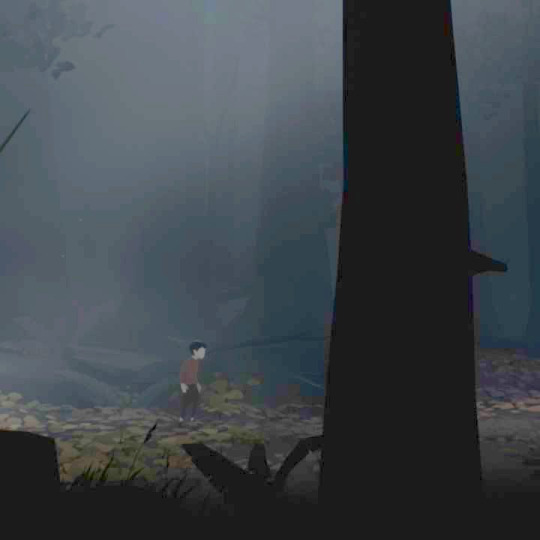
Ok so I just played the classic 1991 game Another World (also known as Out of This World), and it reminded me a LOT of the 2016 game INSIDE which I played about a year ago -- so much that I'm guessing the creators of INSIDE must have taken some inspiration from Another World.
Apparently I really love whatever type of game this is! And I just felt like doing a compare and contrast of the two games.
SIMILARITIES:
Minimalist gameplay style: 2d action-puzzle platformer with just a few basic controls.
No stats, points, levels, meters, inventories, or other interfaces of any kind.
Fairly short but not too short; can be completed in a few play sessions.
Little to no music, just very effective ambient sounds.
Aesthetically beautiful, with a strong sense of setting, mood, and the feel of the environments.
A protagonist who's surprisingly lifelike, despite not even having facial expressions.
Manages to tell a really immersive story without any dialogue.
The story is open to interpretation, but clear enough to make you WANT to interpret it.
A lot of variety in the puzzles; every stage is different and you wonder what will come next.
Does a good job of building tension and drama.
Lots of narrow escapes.
Trial-and-error gameplay where you're going to die a LOT, but you always get to try again, and it's kind of part of the point to discover how many crazy ways you can die.
A lot of creative worldbuilding that's just ambiguous enough to let you know there's even more going on that you don't see.
A dramatic, surprising, and open ending.
DIFFERENCES:
INSIDE is dark and depressing, heavily dystopian, and maybe-sort-of horror depending on how you define horror. It's really beautiful in its own way, but it also made me cry (and not in a happy way). The deaths are also more realistic and might bother some people, especially since the protagonist is a child. The ending is a lot more sad (and strange).
Another World is an upbeat and colorful sci-fi action adventure. It does have a few survival-horror elements (i.e. everything on the planet wants to kill you), but not in a way that's depressing or disturbing. It's also less realistic and a little more wacky; I wouldn't call it silly but it's got much more of a fun vibe. The ending is not 100% happy but not too sad either, and definitely hopeful.
INSIDE is the sort of story that lends itself toward symbolic and metaphorical interpretations.
Another World is more of just a fun story to take at face value. (Although I'm sure you could still find metaphors in it if you want to, and knowing me I probably will sooner or later. 😂)
INSIDE relies heavily on stealth; the protagonist is small and helpless and the game does an excellent job of making you feel that.
Another World has some stealth elements, but you're also able to fight. You get a weapon and learn how to use it (and it's a very cool one).
While both games are primarily linear storylines, INSIDE has an alternate path with a secret ending.
Another World is one storyline with one ending (but it's engaging enough that I didn't find this to be a problem!)
In INSIDE your character is very alone in his quest (well, except for one possible event, but I won't spoil).
In Another World you make a friend and you get to rescue each other!
Conclusion: If you've played either one of these games, and you liked the gameplay style and story presentation method, I recommend you try the other because you will probably like it too! But if you played one and liked it for the vibe, you might or might not like the other, because the two vibes are very different. Either way, I would consider both games to be masterpieces.
4 notes
·
View notes
Text
This is so horrific.
———————
I have been following Siro’s story for 30 years, ever since I went to interview her and four other rural midwives in India’s Bihar state in 1996.
They had been identified by a non-governmental organisation as being behind the murder of baby girls in the district of Katihar where, under pressure from the newborns’ parents, they were killing them by feeding them chemicals or simply wringing their necks.
Hakiya Devi, the eldest of the midwives I interviewed, told me at the time she had killed 12 or 13 babies. Another midwife, Dharmi Devi, admitted to killing more - at least 15-20.
It is impossible to ascertain the exact number of babies they may have killed, given the way the data was gathered.
But they featured in a report published in 1995 by an NGO, based on interviews with them and 30 other midwives. If the report’s estimates are accurate, more than 1,000 baby girls were being murdered every year in one district, by just 35 midwives. According to the report, Bihar at the time had more than half a million midwives. And infanticide was not limited to Bihar.
Refusing orders, Hakiya said, was almost never an option for a midwife.
“The family would lock the room and stand behind us with sticks,” says Hakiya Devi. “They’d say: ‘We already have four-five daughters. This will wipe out our wealth. Once we give dowry for our girls, we will starve to death. Now, another girl has been born. Kill her.’
“Who could we complain to? We were scared. If we went to the police, we’d get into trouble. If we spoke up, people would threaten us."
The role of a midwife in rural India is rooted in tradition, and burdened by the harsh realities of poverty and caste. The midwives I interviewed belonged to the lower castes in India’s caste hierarchy. Midwifery was a profession passed on to them by mothers and grandmothers. They lived in a world where refusing orders of powerful, upper-caste families was unthinkable.
The midwife could be promised a sari, a sack of grain or a small amount of money for killing a baby. Sometimes even that was not paid. The birth of a boy earned them about 1,000 rupees. The birth of a girl earned them half.
The reason for this imbalance was steeped in India’s custom of giving a dowry, they explained. Though the custom was outlawed in 1961, it still held strong in the 90s - and indeed continues into the present day.
A dowry can be anything - cash, jewellery, utensils. But for many families, rich or poor, it is the condition of a wedding. And this is what, for many, still makes the birth of a son a celebration and the birth of a daughter a financial burden.
Siro Devi, the only midwife of those I interviewed who is still alive, used a vivid physical image to explain this disparity in status.
“A boy is above the ground - higher. A daughter is below - lower. Whether a son feeds or takes care of his parents or not, they all want a boy.”
The preference for sons can be seen in India’s national-level data. Its most recent census, in 2011, recorded a ratio of 943 women to every 1,000 men. This is nevertheless an improvement on the 1990s - in the 1991 census, the ratio was 927/1,000.
By the time I finished filming the midwives’ testimonies in 1996, a small, silent change had begun. The midwives who once carried out these orders had started to resist.
This change was instigated by Anila Kumari, a social worker who supported women in the villages around Katihar, and was dedicated to addressing the root causes of these killings.
Anila’s approach was simple. She asked the midwives, “Would you do this to your own daughter?”
Her question apparently pierced years of rationalisation and denial. The midwives got some financial help via community groups and gradually the cycle of violence was interrupted.
Siro, speaking to me in 2007, explained the change.
“Now, whoever asks me to kill, I tell them: ‘Look, give me the child, and I’ll take her to Anila Madam.’”
The midwives rescued at least five newborn girls from families who wanted them killed or had already abandoned them.
One child died, but Anila arranged for the other four to be sent to Bihar’s capital, Patna, to an NGO which organised their adoption.
The story could have ended there. But I wanted to know what had become of those girls who were adopted, and where life had taken them.
Anila’s records were meticulous but they had few details about post-adoption.
Working with a BBC World Service team, I got in touch with a woman called Medha Shekar who, back in the 90s, was researching infanticide in Bihar when the babies rescued by Anila and the midwives began arriving at her NGO. Remarkably, Medha was still in touch with a young woman who, she believed, was one of these rescued babies.
Anila told me that she had given all the girls saved by the midwives the prefix “Kosi” before their name, a homage to the Kosi river in Bihar. Medha remembered that Monica had been named with this “Kosi” prefix before her adoption.
The adoption agency would not let us look at Monica’s records, so we can never be sure. But her origins in Patna, her approximate date of birth and the prefix “Kosi” all point to the same conclusion: Monica is, in all probability, one of the five babies rescued by Anila and the midwives.
When I went to meet her at her parents’ home some 2,000km (1,242 miles) away in Pune, she said she felt lucky to have been adopted by a loving family.
“This is my definition of a normal happy life and I am living it,” she said.
Monica knew that she had been adopted from Bihar. But we were able to give her more details about the circumstances of her adoption.
Earlier this year, Monica travelled to Bihar to meet Anila and Siro.
Monica saw herself as the culmination of years of hard work by Anila and the midwives.
“Someone prepares a lot to do well in an exam. I feel like that. They did the hard work and now they’re so curious to meet the result… So definitely, I would like to meet them.”
Anila wept tears of joy when she met Monica. But Siro’s response felt different.
She sobbed hard, holding Monica close and combing through her hair.
“I took you [to the orphanage] to save your life… My soul is at peace now,” she told her.
But when, a couple of days later, I attempted to press Siro about her reaction, she resisted further scrutiny.
“What happened in the past is in the past,” she said.
But what is not in the past is the prejudice some still hold against baby girls.
Reports of infanticide are now relatively rare, but sex-selective abortion remains common, despite being illegal since 1994.
If one listens to the traditional folk songs sung during childbirth, known as Sohar, in parts of north India, joy is reserved for the birth of a male child. Even in 2024, it is an effort to get local singers to change the lyrics so that the song celebrates the birth of a girl.
While we were filming our documentary, two baby girls were discovered abandoned in Katihar - one in bushes, another at the roadside, just a few hours old. One later died. The other was put up for adoption.
Before Monica left Bihar, she visited this baby in the Special Adoption Centre in Katihar.
She says she was haunted by the realisation that though female infanticide may have been reduced, abandoning baby girls continues.
“This is a cycle… I can see myself there a few years ago, and now again there’s some girl similar to me.”
But there were to be happier similarities too.
The baby has now been adopted by a couple in the north-eastern state of Assam. They have named her Edha, which means happiness.
“We saw her photo, and we were clear - a baby once abandoned cannot be abandoned twice,” says her adoptive father Gaurav, an officer in the Indian air force.
Every few weeks Gaurav sends me a video of Edha's latest antics. I sometimes share them with Monica.
Looking back, the 30 years spent on this story were never just about the past. It was about confronting uncomfortable truths. The past cannot be undone, but it can be transformed.
And in that transformation, there is hope.
54 notes
·
View notes
Note
hi !!!! :3 so, pd seems, in my reading like its a decent part about the kinda mass surveillance and commodification of personhood shit the world has got going on rn, in a kinda (yes, its cliche, but the radiohead influence makes it a bit more palatable) modern ok computer-esque way. anyways, i wanted to ask u, what motivated u to write about these subjects especially ??
i am transgender and so so scared
near every single person in the world carries a camera on them at all times with the capability of broadcasting its view to all of the internet. we have a culture of emotional armor and swords built to slip between its plates, to be angry or afraid or upset or even the wrong kind of happy is cringe. those who believe in some shadow government in some hidden room somewhere spying on us at all times are delusional - this is wrong - where labor can be outsourced for cheaper it will be. taxis are expensive to run, making people drive their own cars and find customers on an app for measly pay is much more cost effective. giving a music writer a salary is too pricey compared to hiring freelancers on a per article basis. and now surveillance has been, like so many other things, outsourced to civilians and their cameras and smartphone apps. a man sitting oddly on a couch is cheating on his girlfriend, a fold in a woman’s clothing is a hidden penis, we are the panopticon and the prisoner… this is the “society of control” - freedom as tyranny.
the nature of reality is at stake in our culture - “what is a woman?” “a woman” - those who refuse to understand transgender people are helplessly tied to some “deep reality” - “i know what you are!!” - which is ultimately an enforcement of the status quo socially constructed reality. transgender people recognize reality as something socially constructed and seek to bend it to their liking… pronouns and chosen names are after all meant for others to use rather than ourselves, they are third person terms, gender never worms its way into the terms “I” and “We”. our personhood is defined by other people, and can be invalidated or revoked by others… the insecurity created by this tension is ripe for advertising. take this boner pill, it will make you more of a man. take this injection, it will make you a woman. we are defined by our outside, our house, our car, our clothes, our skin, our bodies.
this is where the “family nexus” concept comes in - groups of people create their own pockets of reality. to christians, god is real and to deny this is insanity. to hardcore atheists, believing in god is insanity. to many psychiatrists years ago and some still today, to believe to be a different gender is insanity… and the insane deserve less rights than the sane, they don’t even know what is best for themselves. queer people seek to create a new sane. or rather to go “insane” in our own way the same way anyone who believes in anything does. create our own nexus where our experience of reality is simply true.
hope that helps at all and makes any amount of sense
oh yeah ok computer… maybe i’ll go off about that another time… much of the themes and sound of that record were a jumping off point for us. written in the 1990s, the end of history, time has marched on and yet we are still here stuck in capitalist reality. “did you lie to us tony” as if labour could ever do something about the fact that post 1991 “there is no alternative”… deeply tragic record but love runs through all of it undeniably… maybe i’ll go off about that in another post…
173 notes
·
View notes
Text
“In the scripts, Buddy Holly’s song ‘Every Day’ runs through the whole like a thread. It was something that Terry had suggested in 1991, and it was there in the edit. Our composer, David Arnold, created several different versions of ‘Every Day’ to run over the end credits. And then he sent us his Good Omens theme, and it was the Good Omens theme. Then Peter Anderson made the most remarkable animated opening credits to the Good Omens theme, and we realised that ‘Every Day’ didn’t really make any sense any longer, and, reluctantly, let it go. It’s here, though. You can hum it.”
-Neil Gaiman
In 1991 Terry Pratchett and I were staying in the Chateau Marmont hotel in LA writing Outline after Outline for a Good Omens movie for Sovereign Pictures. And at some point Terry and I started talking about songs, and I said it would be great to find a good End of the World song, and Terry suggested "Everyday" by Buddy Holly. He pointed out that on one level it was a cheerful upbeat love song, but in another way it seemed to be describing the impending arrival of something unstoppable and dark:
Every day, it's a-getting closer...
So when I wrote Season 1, I threaded "Everyday" through it. But then David Arnold wrote the Good Omens theme, which was even better. So we never used Everyday.
#good omens#neil gaiman#crowley#ineffable husbands#aziraphale#terry pratchett#good omens fun facts#good omens 2#beelzebub#everyday#its a getting closer#contains information in a tuneful way
65 notes
·
View notes
Text

LCDrarry 2024 Master List
Part 2: More Fic
Dear lovely Participants, Creators, Alpha and Beta Readers, Cheerleaders, Readers and Fans of this fest,
The 6th installment of LCDrarry has come to an end, and we'd like to thank you all for taking part in this fest, for creating so many amazing new Drarry works for us all to enjoy, for commenting on your favourite creations, for sharing and recommending the LCDrarry gems with and to your friends and blog followers, and for making this fest another amazing experience for everybody!
Fests would not exist without their participants or readers! You're all amazing! And we're so happy that you chose this fest in the vast and wonderful offerings of HP and Drarry events.
You can find out under the cut who created what ;D
~Your LCDrarry Mods
Tami (@celilasart) and Suzi (@erin-riwen)
PS: Please have a look at the author notes and tags on AO3 for additional information and more detailed warnings. Thank you!
PPS: You can find a link to Part 1 of this Master List under the cut.
Enjoy!
Part 1 of this Master List with all the lovely podfics, art and more fics can be found here.
***
More Fic
***
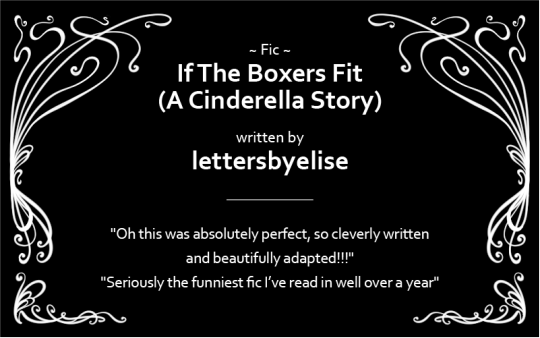
If The Boxers Fit (A Cinderella Story)
Prompt: "100 Girls", 2000
Author: lettersbyelise
Word Count: 8,360 words
Rating: Explicit
Warnings: No Archive Warnings Apply
Summary: When Draco ends up shagging a hot, mysterious stranger in a broken Ministry lift and is left with nothing but a sexy pair of red boxers to remember them by, Draco’s friends go sleuthing.
***

surviving the mist
Prompt: "The Mist", 2017, TV Show
Author: gnarf
Word Count: 7,153 words
Rating: Mature
Warnings: one homophobic slur, Uncanny Valley, Blood, Trauma Bonding, mentions of past starvation, hinted at child abuse, Torture (off screen), Post-War, Minor pining, Clueless Harry Potter, Happy Ending, Sharing a Bed, involuntary housemates, Inspired by The Mist - Stephen King, LCDrarry 2024
Summary: Everything was perfect for Harry, until Draco moved into the cottage next door. He thought that Draco Malfoy being his neighbour was the worst that could happen to him. Until the outside world got turned into a death zone.
Trapped by a mysterious fog, Harry and Draco have to try and get along while surviving the nightmares hiding outside, waiting, luring...
***

Listening to the Manor
Prompt: "Spirited Away", 2001, Hayao Miyazaki
Author: meandminniemcg
Word Count: 11,183 words
Rating: Teen and up
Warnings: No archive warnings apply
Summary: When Dudley gets turned into a bird on a roadtrip, Harry has to save his cousin. He meets a mysterious blond man and a sentient manor house that needs his help. But first he has to do his new job at the Magical Creature spa, the only reason he can stay...
***

Twin Blades
Prompt: “Star Wars: Episode III - Revenge of the Sith”, 2005, George Lucas
Author: lucio
Word Count: 3,525 words
Rating: Teen and up
Warnings: lightsaber combat, nightmares
Summary: Harry advances a few steps toward Draco, who doesn’t move, only watches him approach with narrowed eyes. “If you’re so sure the Jedi have no power, duel me. If you win, your master will be proud of you.”
Draco’s eyes glitter. “And if you win?”
“We’ll find out, won’t we?” Harry raises his lightsaber, readies himself. “Come on.”
Without another word, Draco lunges at him.
Or, a Drarry-flavored reskin of the battle on Mustafar.
***

Hope Is A Thing With Feathers
Prompt: "Thelma and Louise", 1991, Ridley Scott
Author: Stillwriting
Word Count: 33,335 words
Rating: Explicit
Warnings: Creator chose not to use Archive Warnings
Summary: Harry is disillusioned with the Aurors, his relationship with Ginny, and is tired of all the hero worship but feels trapped. Draco, still hated by the Wizarding world, decides to get away and shares his plan with Harry, his only friend. Harry jumps at the chance to go with him.
They share in the freedom of their adventure, but things don’t go according to plan. Amidst their misfortunes, they discover new talents, courage in the face of tragedy, and above all, love.
***

Slipping through my fingers all the time
Prompt: "Mamma Mia", 2008, Phyllida Lloyd
Author: TheGoblinMatriarch
Word Count: 11,378 words
Rating: Teen and Up
Warnings: sex while on drugs, drinking
Summary: Recently-divorced Harry returns to Serenity Commune, site of his wildest youthful romps and the beginning of his recovery from trauma, to get out of a rut (and because Hermione made him). Unfortunately, sex, drugs, and dancing aren't all that await - he'll have to confront his past and what life might have been.
***

Romancing the Dragon
Prompt: "Romancing the Stone", 1984, Robert Zemeckis
Author: jtimu
Word Count: 34,382 words
Rating: Explicit
Warnings: Action movie typical violence
Summary: Harry Potter writes romance novels from the comfort of his London townhouse, with the assistance of his beloved cat, Juliet. He does not engage in rescue missions, talk to dragons, or develop feelings for Draco Malfoy. That would be absurd.
***

first, she fell
Prompt: "Anatomy of a Fall", 2023, Justine Triet
Author: luminae
Word Count: 1,648 words
Rating: Mature
Warnings: angst, referenced character death, open ending, referenced adultery, speculated murder
Summary: Harry's wife is dead.
No one knows quite what that means.
***

Caribou Garden
Prompt: Nature Documentaries (genre, any year)
Author: CreepingMyrtle
Word Count: 2,641 words
Rating: Teen and up
Warnings: None
Summary: Alone with his swotty, posh, nemesis-turned-colleague on an uninhabited island in the far north, cinematographer Harry Potter grapples with his inconvenient crush. A nature documentary-inspired fic with magical caribou migrations, dramatic landscapes, and only one tent.
***

Leap Year
Prompt: "Leap Year", 2010, Anand Tucker
Author: youhavemyswordandmybow
Word Count: 29,064 words
Rating: Mature
Warnings: None apply.
Summary: Draco Malfoy has come a long way. He has a successful business and a muggle-born high-flyer boyfriend.
One tiny thing - it's been four years and he has no ring.
No matter, he'll take things into his own hands.
Feb 29th is an Irish muggle tradition that he'll happily jump on. Archie (boyfriend) is in Ireland - he'll simply portkey over and pop the question.
One (LARGE) problem. The portkey office messed up and he's landed outside Harry Potter's pub.
The same Harry Potter that hasn't been seen for ten years.
*Big sigh.*
***

Runaway Groom
Prompt: "Runaway Bride," 1999, Garry Marshall
Author: skotini
Word Count: 30,044 words
Rating: Teen and up
Warnings: Arranged marriage (not between Harry and Draco), Infidelity if you squint (not between Harry and Draco)
Summary: OK, so Draco's feeling so nervous about his upcoming wedding to his fiancée Astoria Greengrass that he could faint. That's one of the pitfalls of an arranged marriage, right? Just because he's run out of his past three weddings, doesn't mean this one won't go ahead. He just has to keep his eyes on the finishing line, and ignore the sudden reappearance of Harry Potter, who seems to be determined to turn his world upside down. Again.
***
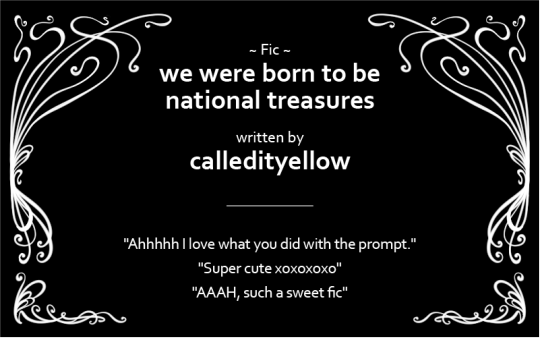
we were born to be national treasures
Prompt: "Legally Blonde", 2001, Robert Luketic
Author: calledityellow
Word Count: 4,979 words
Rating: General Audiences
Warnings: There is nothing triggering in the work, although it does heavily rely on the subject of needing academic validation as a woman in a patriarchal society.
Summary: Danica Malfoy is determined to study law and move forward in life. But is anything really ever that simple?
***

The Potters: Possessed Case
Prompt: "The Conjuring", 2013, James Wan
Author: Nelween
Word Count: 12,039 words
Rating: Mature
Warnings: Horror, blood, vomiting, mention of suicide, possession, exorcism
Summary: After a lecture, Harry and Draco meet a frightened woman, telling them that her entire family is scared to death of their new house.
But Harry and Draco wanted to take a break after a traumatising case. Maybe it's just natural causes and the house isn't haunted, right?
***
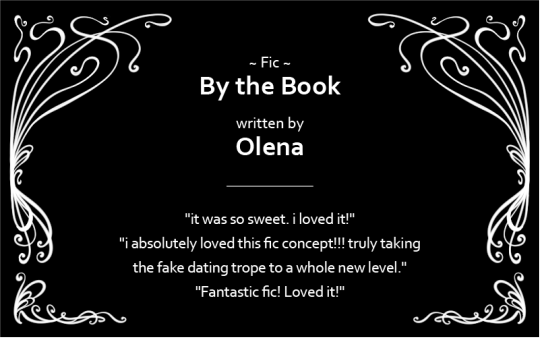
By the Book
Prompt: "The Proposal", 2009, Anne Fletcher
Author: Olena
Word Count: 14,586 words
Rating: Teen and up
Warnings: None
Summary: It’s hard being Draco Malfoy: workaholic publishing professional extraordinaire. Between revolutionizing the Wizarding World and fighting with Harry Potter, his chief of staff, it makes sense Draco forgot to check his mother filed some paperwork. Oops. Easy enough to avoid deportation by saying he’s engaged to said manager.
Too bad that plan involves visiting Ottery St Catchpole, a gaggle of redheads, and defrauding the government.
***

this strange effect
Prompt: "Killing Eve" (2018 - 2022)
Author: harDeehar
Word Count: 30,670 words
Rating: Mature
Warnings: Graphic Violence, Blood and Injury, Assassinations, Killing Eve AU, Murder, Light Poisoning, Obsessive Behavior, Reference to past addiction issues, Presents
Summary: Harry hated his job, his cousin, and his inability to figure out how to fit into the boring, depressing world around him. He kept his peace until Draco Malfoy turned out to not be dead like Harry thought he was. Deadly, though? Harry was going to figure that out.
***

The Heart of the Heart
Prompt: "Howl's Moving Castle", 2004, Hayao Miyazaki
Author: Poljupci
Word Count: 52,775 words
Rating: Teen and up
Warnings: None
Summary: Harry Potter’s boring routine comes crumbling down when he takes the wrong shortcut at the wrong time; he almost ends up in a brawl, gets rescued by a handsome stranger, successfully escapes sentient tar, learns to walk on air and then becomes victim to a spiteful, petty and undeserved ageing curse - and all that within a single afternoon!
Now transformed into an old man, Harry decides to run away in search of a way to reverse the spell, but the path is precarious and the journey long. As he's trying to make his way through magic and treachery, danger and deceit, it's becoming abundantly clear that something more is hidden behind petty magic - something deeper and more valuable and connected all too thoroughly to what may only be classified as love.
***

End of Beginnings
Prompt: "All of Us Strangers", 2023, Andrew Haigh
Author: LouisIsSoGolden
Word Count: 5,324 words
Rating: Explicit
Warnings: Canonical Character Death
Summary: As Harry and Draco start developing a relationship, Harry finds himself drawn back to the Potter house in Godric's Hollow, where his parents appear to be living just as they were on the day they died.
Based on the movie All of Us Strangers (2023) though you don't have to have seen it to understand the fic.
***

Love Will Abide
Prompt: "The Last of Us", Episode 3: "Long, Long Time", 2023
Author: dodgerkedavra
Word Count: 39,547 words
Rating: Explicit
Warnings: Major Character Death, Suicide
Summary: Harry and Draco survive the apocalypse.
This is what happens after.
***

Theme and Variations
Prompt: "Rush", 2013, Ron Howard
Author: lucifergraced
Word Count: 24,890 words
Rating: Mature
Warnings: brief mentions of (canonical) child abuse
Summary: Draco had fucked him over, yet again. Harry was sick of it.
With music swelling from the orchestra below, lights beating down on him hard enough to break a sweat before the first variation, the audience rapt with attention, this should have been the greatest moment of Harry’s life. But it wasn’t. Of course Draco fucking Malfoy had to ruin this for him too.
Harry took a shaking breath and began to dance.
***

Happiness Seems to be Loneliness
Prompt: "Saltburn", 2023, Emerald Fennell
Author: newskyillusion
Word Count: 29,811 words
Rating: Explicit
Warnings: Unhinged Harry Potter, Dark Harry Potter, Obsessive Harry Potter, Character Death, Animal Death, Fat Shaming, Minor Character Death, Dead Dove: Do Not Eat, Inspired by Saltburn (2023), References to Frankenstein, Necrophilia, Off-scene suicide (mentioned)
Summary:
Fucking Pansy was like fucking a fish.
or
Drarry meets Saltburn
***

Count On Me
Prompt: "Put Your Head On My Shoulder", 2019, Netflix
Author: Shewhxmustnxtbenamed
Word Count: 23,044 words
Rating: General Audiences
Warnings: fake dating, forced cohabitation
Summary: University students Harry Potter and Draco Malfoy run into each other one day. Literally. On bikes. After that, they can't get away from each other, no matter how hard they try. And then, it seems, they might not want to. Based heavily on the C-Drama "Put Your Head On My Shoulder" on Netflix.
***
Part 1 of this Master List with all the lovely podfics, art and more fics can be found here.
As always, reblogs here on tumblr are very much appreciated to promote all the wonderful works of LCDrarry. But of course, please also shower our creators with comments and kudos on AO3 ;D
Thank you! Read you next year ;)
#lcdrarry 2024#lights camera drarry 2024#lights camera drarry#lcdrarry master list#lights camera drarry master list#lcdrarry 2024 master list#drarry#drarry fest#draco malfoy#harry potter#drarry fanart#drarry podfic#drarry fic#drarry fic rec#drarry fic recs#drarry art#draco/harry#harry/draco#draco x harry#harry x draco#hpdm#dmhp#hp fest#drarry event#lcdrarry
74 notes
·
View notes
Text
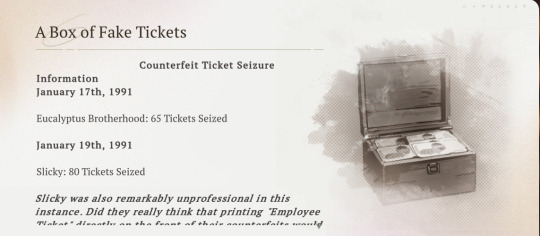
So from this note alone in the event, this sets the Uluru Games event is around 1991. Which also confirms another thing about the Storm.
It has a radius.
It's already been stated how certain shelters protect them from the Storm, but another way is to predict the impact radius and make it a safe amount of distance to avoid the torrential rain like how Apeiron tried to do with their expeditioners.
Meaning certain parts of the world has been reversed to a certain era, but could remain that era for a longer time in comparison to other places that the Storm has touched often. And if the Storm behaves like actual weather, it's unsurprising that a place like Australia has lesser exposure while areas like Europe is struggling to get through the Storm.
#reverse 1999#reverse 1999 lore analysis#uluru games#man we're being fed so much lore in this event#most of them speculations i've had for a long time. i'm glad it's being validated
127 notes
·
View notes